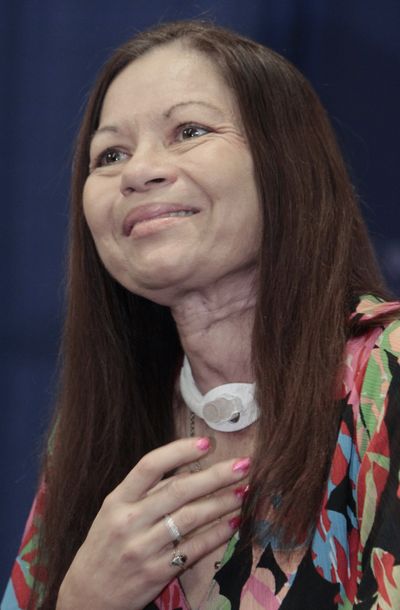Transplant gives woman voice back

SACRAMENTO, Calif. – A woman whose natural voice could have been silenced forever because of vocal cord damage is able to talk again after undergoing a rare voice box transplant.
Brenda Charett Jensen, 52, reunited Thursday with the team of surgeons who performed the delicate operation last October, only the second surgery of its kind performed in the United States.
“It’s just been amazing – simply, simply amazing. And I’m still in shock,” Jensen said in a raspy voice at a news conference with her doctors. “I never know what’s going to come tomorrow, but I know it’s going to be better than where I’ve been.”
Jensen damaged her vocal cords more than a decade ago after she repeatedly pulled out her breathing tube while under sedation in the hospital.
Because the injury left her breathing passage completely closed, the Modesto woman had also been unable to smell – a sensation that she is enjoying again.
Before the transplant, Jensen “talked” with the help of a hand-held device that produces an electronic voice.
The robotic-sounding device, which Jensen’s granddaughter dubbed the “talkie-talkie,” led to people hanging up on her or treating her like she was not there, so Jensen said the risk of the surgery was worth it.
After years of putting up with humiliation and teasing, “I was game to go. I wanted to talk again,” said Jensen, a slim woman who walks with a cane.
The operation lasted 18 hours over two days. Doctors replaced her voice box, windpipe and thyroid gland with that of a donor who died in an accident. The transplant, which came after nearly two years of planning, was led by the University of California-Davis Medical Center and included experts from England and Sweden.
Chief surgeon Dr. Gregory Farwell said the neck is “an unbelievably complex structure” with tiny nerves that had to be connected using sutures smaller than a human hair. Surgeons spent 10 hours working under a high-power microscope as they sewed the nerves back together, he said.
Two weeks after the transplant, Jensen voiced her first words to her doctors in a hoarse tone: “Good morning,” followed by “I wanna go home” and “You guys are amazing.”
Jensen has since been able to speak more easily. Doctors said Jensen’s voice was her own and not that of the donor.
The special qualities of a person’s voice are determined by the shape of the throat, mouth, nose and sinuses. Following the transplant, Jensen told doctors that friends who had not heard her speak in years were able to recognize hints of her “old” voice.
Jensen has worked a variety of jobs, including driving trucks and working in a restaurant and as an executive secretary before going on disability several years ago. She is not currently working, but she hopes to get a job again with her voice restored.
Dr. Peter Belafsky, principal investigator of the UC Davis laryngeal transplant project, said the operation offers hope to others who have suffered the loss of their voice.
“I’ve had three messages and two texts just this morning from patients saying, ‘Am I going to be a candidate for this?’ ”
Not all patients who lose their voice are eligible for voice box transplants. It’s still considered experimental, and recipients have to constantly take anti-rejection drugs that can shorten life expectancy.
Jensen was a good fit because she was already taking the drugs after a kidney-pancreas transplant in 2006, doctors said.